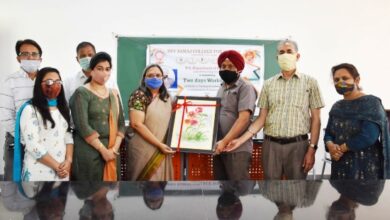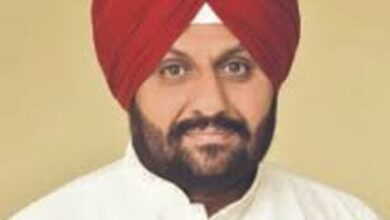Ferozepur News
THE ANATOMY OF PETTY CORRUPTION – Major General Rajiv Edwards, VSM (Retd)

THE ANATOMY OF PETTY CORRUPTION
- The country has recently observed the Vigilance Awareness Week on the theme ‘Corruption Free India for a Developed Nation’. As we prepare to observe the World Anti Corruption Day on 09 Dec, it would be befitting to re-visit the scourge which is a part and parcel of our daily lives.
- Corruption is our default setting. As far back as the 4th century, Kautilya in his famous treatise Arthashastra, alluded to corruption, calling the receiver of graft as ‘pratigrahaka’.
- From the perspective of the common man, ‘Petty Corruption’ is the most significant. It is the ‘everyday abuse of entrusted power by low and mid-level public officials in their interactions with ordinary citizens, who often are trying to access basic goods or services in municipalities, hospitals, schools, police stations, courts, and various other government departments’. As it typically occurs at the point of service delivery, it directly affects citizens’ access to fundamental rights and other benefits as human beings.
- While ‘grand corruption’ and ‘systemic corruption’, has visibly reduced, ‘petty corruption’ continues unabated. Sadhguru Jagadish Vasudev aptly remarks, ‘people are not corrupt, they are innocent of integrity…..there is no corruption in India, there is only banditry!’, thereby pointing to the organized method in which corruption operates in the society.
- While power corrupts people, it is also true that people corrupt power. Corruption is actually a symptom of the disease called greed; an insatiable desire for money, power, personal belongings, status, food etc. It is believed that there is a genetic basis to greed. This is the Ruthless or Daring Gene, which is also known as Arginine Vasopressin Receptor 1A (AVPR1A). Extremely greedy and selfish person are said to have a shorter version of AVPR1A.
- Greed is also called the Great Gatsby or Wealth Accumulation Disorder. The ‘money high’ is a kind of self inoculation against underlying insecurity and unfulfilled needs……at best a temporary psychological substitute. Greed is also known to release dopamine, the ‘feel good’ hormone and greed may increase over time, to get enhanced ego gratification, to feel good. Ironically, society does not view greed as a potential mental health concern. This thought process makes it difficult for corrupt people to acknowledge their behavior as potentially detrimental to themselves and others. Material acquisitions can mask from others and themselves the deficits in their core self image. The Native Americans termed it as an ‘illness of the soul that poisoned the mind’.
- Societal and family demands are significant contributory factors to corruption…the yearning and pressure to compete in the ‘material’ race of an illusionary world! The internal rationalization of guilt may impel the person to adopt the moral high ground; a defence mechanism to disguise their actuality …. the over emphasis on self virtuousness may at times be a giveaway of the malaise.
- It has been aptly stated that, ‘corruption begins where belongingness ends’. The venal act is incongruous with the pride of being created in the image of the Creator, of being a citizen of India and, the pride of a value based parentage. The financial and societal costs of corruption are considerable when aggregated on a national scale. The 5th largest economy in the world, with a global corruption index of 85 among 180 countries and the highest bribery rate in Asia is worrisome. It is our own citizens who are soiling the image of the country and pulling it down!! Hence, in a sense, being corrupt may be equated to being a traitor… it works at cross purposes with the interests of the country!
- All holy texts regard corruption as an ungodly activity. Consequently, religion by itself should be an antidote to corruption. However, behavioral ethics by and large tends to ignore issues of faith. There is a perception that unscrupulous people are inclined to be more religious…the over religiosity may have something to do with the fear of divine reprisal for their transgressions!, and an unsubstantiated belief that their ‘deep faith supersedes morality’! This is the anti thesis of spirituality. By ignoring karma, we incur its fruit as much as we reap by accepting it… ‘upar wale ki lathi mein awaz nahin hoti’!
- The indifference of citizens is the breeding ground for corruption. The reasons may be the lack of faith in the establishment, the fear of consequences and in a system of institutionalized corruption, whom to report! The fact is that the giver of graft is as much guilty of moral weakness. It is the probability of getting caught, prosecuted and sentenced that holds the key. And this will certainly not happen until and unless the citizenry is rid from any sort of apprehension..
- The authorities need to aggressively reach out to the citizenry if indeed they are serious about minimizing corruption…the ‘oversight’ needs to be much more pro-active and not dependent on reporting. ‘Anonymous Surveys’ in localities and market segments and ‘Crowd Based Reporting Apps’ will be very useful. The concept of ‘Guardians of Governance’, may also be considered. Government departments must take cognisance of employees living beyond their means. There is also a need to have legal provisions to check graft in the private sector. Most importantly, the huge gap between policies and practice needs to be bridged expeditiously.
- It is time that freedom from corruption merits the status of a fundamental and inalienable human right. As tax paying citizens of ‘New India’, we have a right to expect both public and private agencies to be honest and responsive and not extortionate.
- As the country celebrates 75 years of independence, let us all take the ‘integrity pledge’ to reject corruption. The ‘abhav’ and ‘dabaav’ to remove the ‘tradition’ of corruption, which the Prime Minister referred, to mark the recently concluded Vigilance Corruption Week needs to be both much more vigorous and rigouress. Satyameva Jayate.
Major General Rajiv Edwards, VSM** (retd)
(The Officer is a Historical Researcher. Views expressed in the article are personal)
……………………………………………………………………………………….






